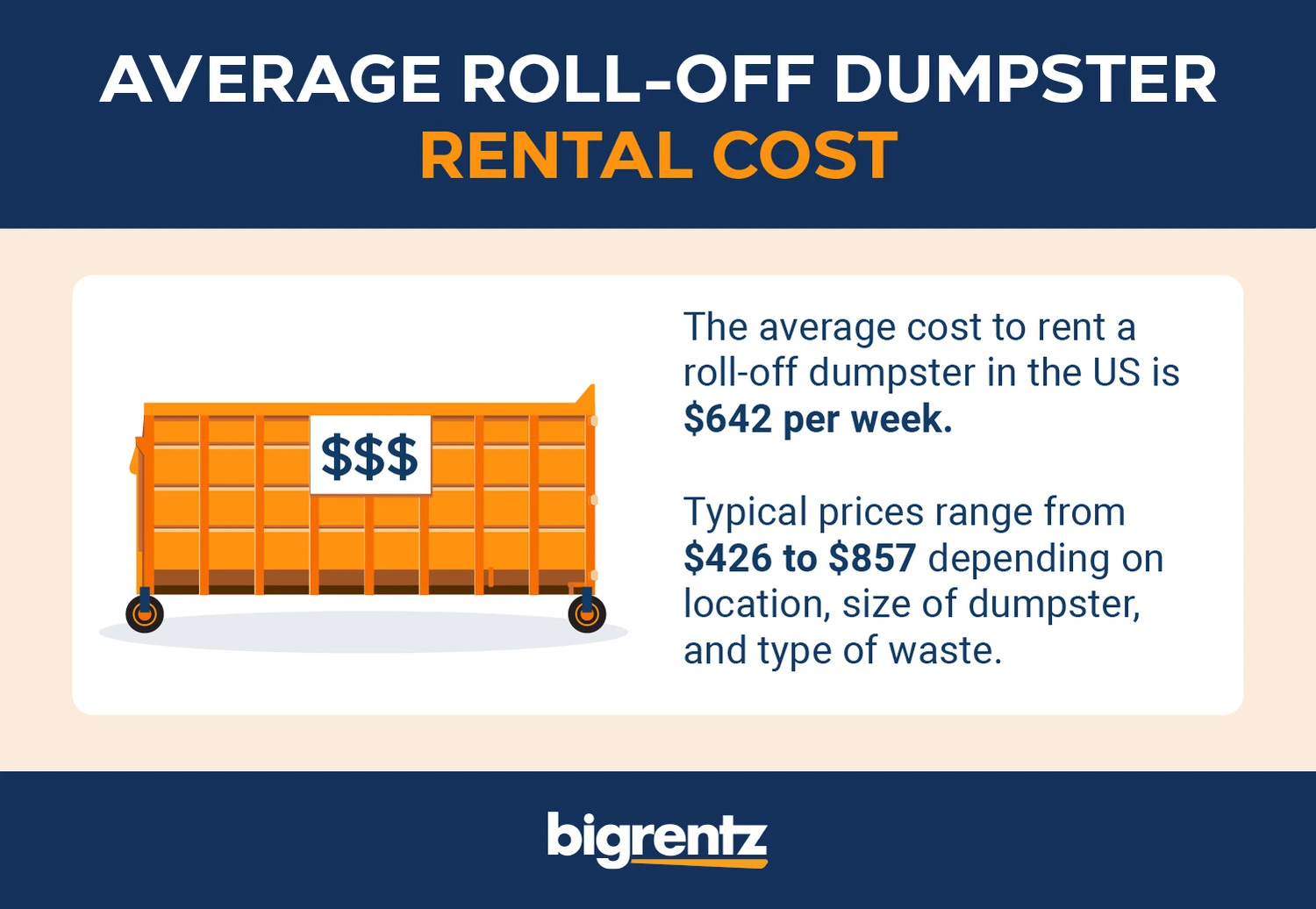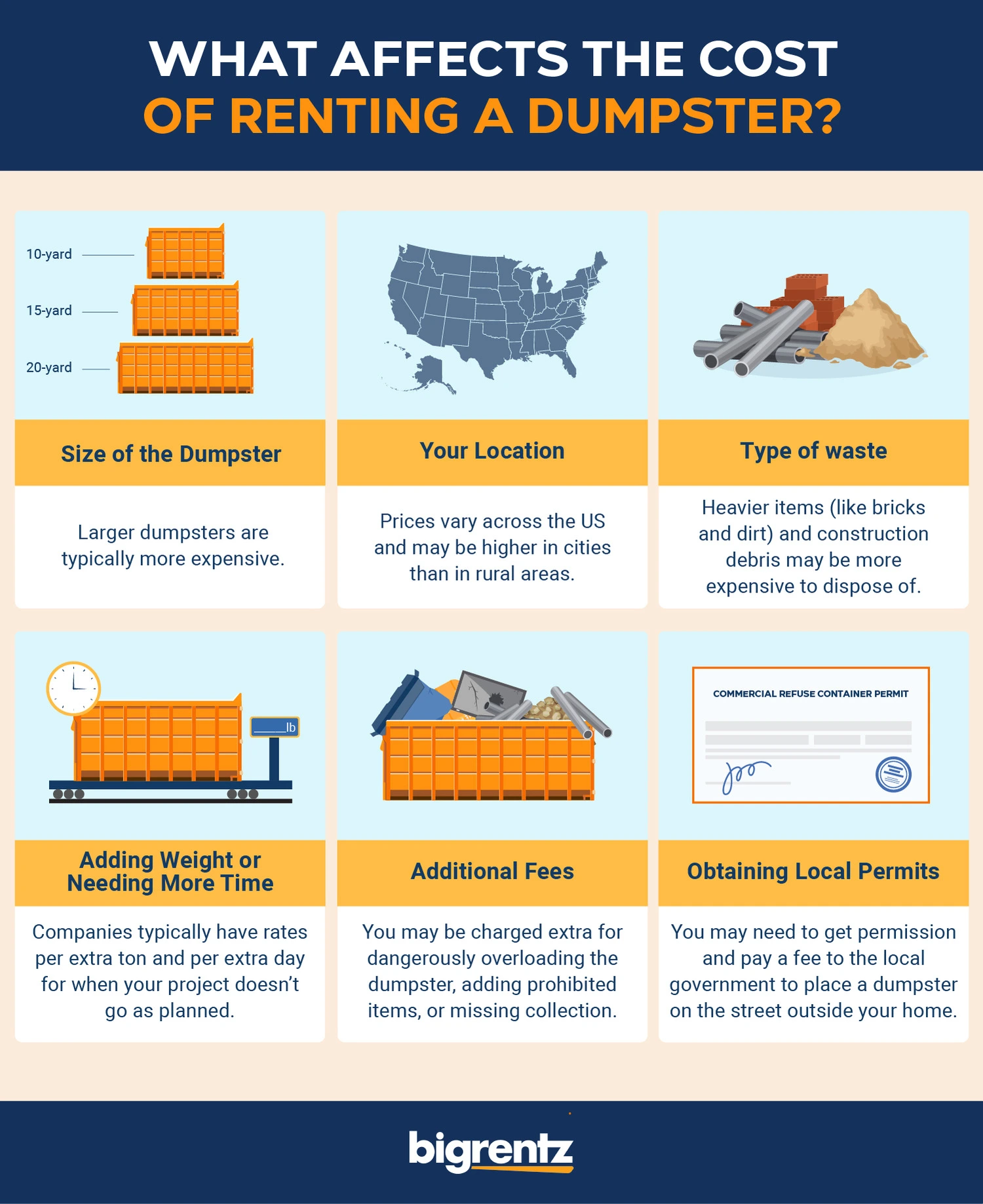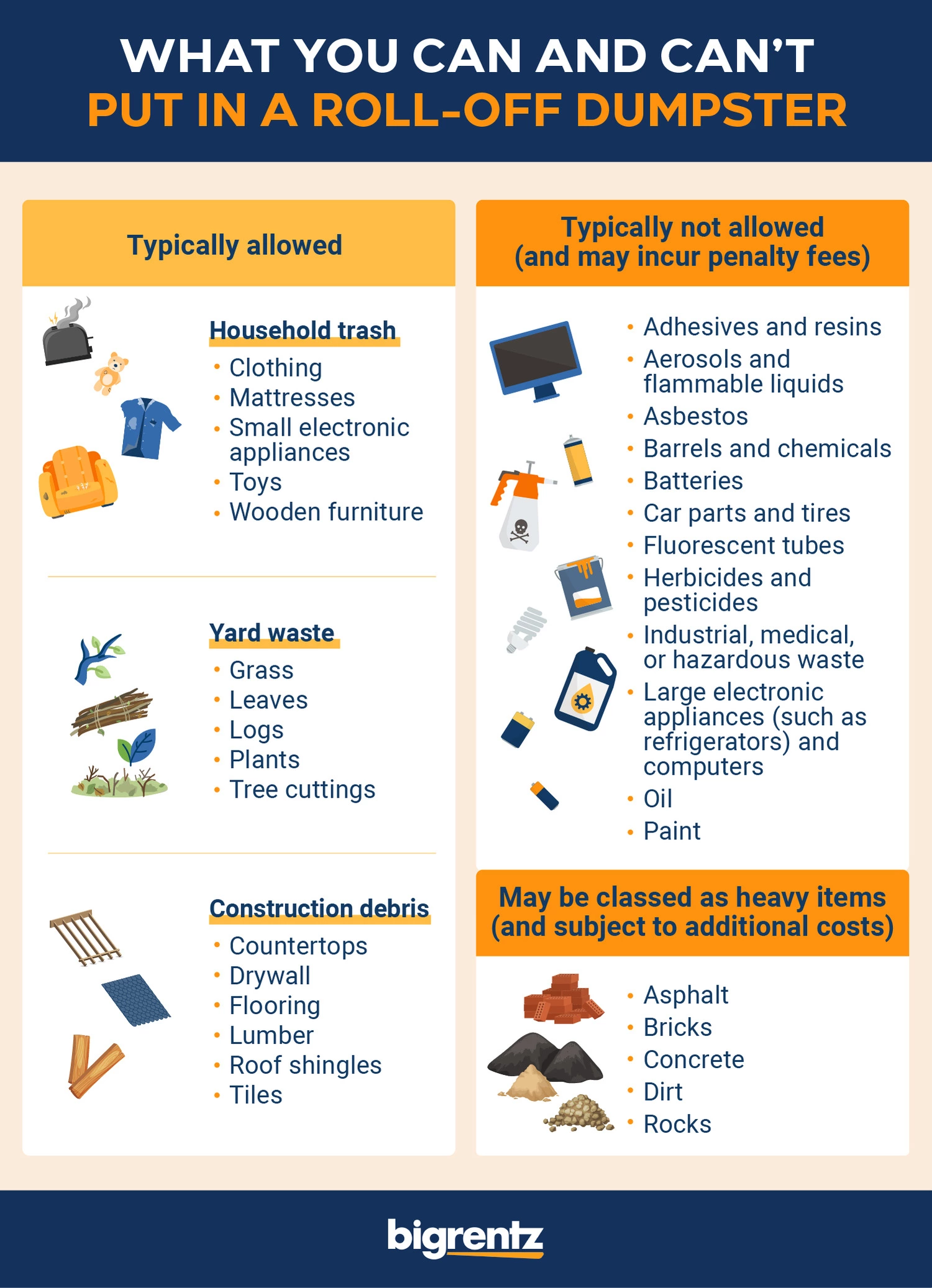dumpster rental bethlehem pa
dumpster rental lowell
The average cost to rent a roll-off dumpster in the U.S. is $642 per week. Typical prices range from $426 to $857 depending on the size you need, what you’re disposing of, and where you live.
In this post, we go over the average roll-off dumpster rental prices in the U.S. according to size, location, type of waste, and any extra fees, so you’ll know how much to budget for and if you’re getting a good deal.
We also explain how to choose the dumpster you need based on the size and weight of your trash or debris, and how to get the best price.
Table of Contents
- Roll-Off Dumpster Rental Prices
- What Else Affects the Cost of Renting a Roll-off Dumpster?
- What Size Roll-off Dumpster Do I Need?
- How Much Does My Trash Weigh?
- What Materials Aren’t Allowed in a Roll-Off Dumpster?
- 4 Tips for Saving Money When You Rent a Dumpster
Roll-Off Dumpster Rental Prices
Roll-off dumpsters are a type of dumpster with wheels. They can be easily delivered to your home and then hauled away. They’re suitable for both construction and residential or cleanup projects.
Explore All Dumpsters

The cost of your rental can vary depending on the company you rent from, availability, and how far in advance you make your rental. Dumpster prices usually include certain charges like dumpster delivery and pickup, landfill fees, dump fees, administrative fees, and agreed-upon tonnage for your waste.
Most dumpster rentals are for 7 to 10 days.
By Size
The larger the roll-off dumpster, the higher the average cost, since it can hold more material.
The smallest roll-off dumpster size is usually 10 yards. Some companies might offer other types of dumpsters as small as 2 to 10 yards.
By Location
Roll-off dumpster prices vary across the U.S. Here are some average prices for common roll-off dumpster sizes in various cities.
By Type of Waste
Dumpster rental costs can also vary depending on the type of materials you’re disposing of. Heavy materials like bricks, concrete, and dirt might require advanced arrangements with the rental company, since they sometimes can’t be mixed.
Here are a few common types of debris included in most dumpster rentals:
- Household trash: This refers to residential waste, usually consisting of clothing, toys, wooden furniture, mattresses, and small electronic appliances. However, it doesn’t include food waste and larger appliances, like refrigerators and air conditioners.
- Yard waste: This includes leaves, grass, plants, and tree cuttings and logs from yard work or landscaping. Dirt and rocks may be classed as heavy items and not included.
- Construction debris: This typically consists of materials like drywall, tiles, flooring, countertops, roof shingles, and lumber. Bricks, asphalt, and concrete may be included or may be classed separately as heavy items.
Roll-off dumpsters that allow construction debris are typically more expensive to rent since they can hold heavier materials. In general, you may have to pay extra fees to dispose of heavy materials like:
- Asphalt
- Bricks
- Concrete
- Dirt
- Rocks
You also might only be able to dispose of one of these materials at a time. Dumpster companies may not allow you to mix materials or will only allow it if you contact them in advance and ask.
Items that aren’t typically allowed in roll-off dumpsters include:
- Hazardous materials, like asbestos and industrial or medical waste
- Flammable items, like fuel, batteries, and paint
- Large electronic appliances
- Adhesives and resins
- Tires
What Else Affects the Cost of Renting a Roll-off Dumpster?
In addition to dumpster size, type of debris, and rental period and location, a few other factors could affect your total rental cost.

Adding Extra Weight
If you exceed the weight limit of your dumpster, you’ll probably be charged overage fees. Weight limits depend on the size of the dumpster, so you can avoid extra charges for this by picking the right dumpster size for the amount of material you have.
Needing a Longer Duration
If you end up needing your dumpster for longer than your agreed-upon rental period, you’ll be charged for the extra time.
Additional Fees
In addition to fees for extra weight and extra time, you could also incur additional charges for the following:
- Disposing of prohibited items: If you try to throw out an item that the landfill doesn’t accept, you may be charged a disposal fee. Contact the dumpster rental company to make sure you know exactly what you can throw away.
- Causing the driver to wait: Dumpster rental services may charge you a fee to cover fuel costs and delays if the driver can’t collect the dumpster as scheduled, in cases where you’re still using it, access is blocked, or the dumpster can’t be moved.
- The dumpster is overloaded: If the dumpster contains too much material for its size, it’s hard to move safely—overloading causes hazards like hauling difficulties or falling debris from overflow. You might be charged fees for going over the tonnage, as well as for causing delays in the process.
- The dumpster or the waste inside is stuck: If the dumpster has sunk into the ground due to weight and can’t be moved, you might have to pay a tow fee to remove it. Similarly, if the dumpster has been packed too tightly and waste is stuck inside, you might have to pay the landfill extra to remove it.
Local Permits
Depending on where you live, homeowners may need a permit to place the dumpster outside your property since it’s technically public space, like on the street or across the sidewalk. The cost and procedure can vary by municipality. Since it’s something that happens at the local level, it’s best to contact your local government office for more information.
The process typically involves submitting an application with the details of your project and the company you’re renting the dumpster from. Make sure you check the length of the permit against the length of your rental so you don’t go over the time you’re allowed.
The company you rent from may also be able to advise or even arrange the permit for you.
What Size Roll-off Dumpster Do I Need?
The dumpster size you need depends on how much material you plan to dispose of and how much space you have available.
Dumpster sizes are measured in cubic yards. A cubic yard is 3 feet tall, by 3 feet long, by 3 feet wide. To help you visualize how much you can fit in a dumpster, here are some examples:
- Trash bags: A large trash bag holds about 20 gallons of waste. Approximately 10 trash bags fit into one cubic yard.
- Wheelbarrows: A wheelbarrow holds up to five cubic feet. Approximately six wheelbarrow loads make up one cubic yard.
- Truck loads: A pickup truck with a five-by-eight-foot bed typically holds two cubic yards, up to the height of the bed.
Here’s an overview of common dumpster sizes, how much each size of dumpster can hold, and their use cases.
How Much Does My Trash Weigh?
Once you know roughly what size dumpster you’re looking for, the next step is to calculate the weight of your trash. Knowing about how much you’re disposing of in advance helps ensure you pick the right dumpster size and won’t go over the weight limit (typically measured in tons).
To help you calculate, here are some common items you might throw away and their weight in tons:
- Carpet: 120 square feet = 1 ton
- Drywall: 25 sheets of drywall (4×8 half-inch sheets) = 1 ton
- Asphalt roof shingles: 25 bundles = 1 ton
- Bricks: 400 to 500 (depending on brick size) = 1 ton
- Concrete: 2.3 cubic yards = 1 ton
- Yard waste: 8.6 cubic yards = 1 ton
- Asphalt paving: 2.6 cubic yards = 1 ton
- Wood: 12 cubic yards = 1 ton
If you’re not sure how much your trash weighs, call us today. Our representatives can help you assess which dumpster is the best fit for your needs.
What Materials Aren’t Allowed in a Roll-Off Dumpster?
Though roll-off dumpsters can accommodate a lot of different things, there are some items and materials you can’t throw away. Items typically not allowed in dumpsters include (but are not limited to) the following:
- Adhesives and resins
- Aerosols and flammable liquids
- Asbestos
- Barrels and chemicals
- Batteries
- Car parts and tires
- Large electronic appliances (such as refrigerators) and computers
- Fluorescent tubes
- Herbicides and pesticides
- Industrial, medical, or hazardous waste
- Oil
- Paint

4 Tips for Saving Money When You Rent a Dumpster
Renting a dumpster doesn’t have to break the bank. Here’s how to choose a dumpster that not only fits your waste management needs but also stays within your budget.
Download our FREE dumpster rental guide e-book today!
Assess the Scope of Your Project
Before you commit to a dumpster rental quote, take time to fully assess the size and type of waste you’re disposing of. See if you can break materials down to fit more into a smaller dumpster.
Renting a larger dumpster than you need is a waste of money. On the other hand, renting one that’s too small and overfilling it could lead to extra fees.
Also, make sure you check what materials you’re allowed to dump. Some companies charge different rates based on the materials you’re throwing away, so checking can help you avoid charges from the landfill.
Prepare in Advance
It’s easy to underestimate how much time you need for a project, especially if it involves multiple steps. You might think you only need a few days to do your spring cleaning, but, once you get into it, going through things and figuring out what to toss might take longer than you expected.
It’s smart to do what you can before the dumpster arrives, so you can make the most of your rental. For example, take time to separate items and decide what to get rid of in advance.
This will not only give you a better idea of how much waste you have but also prevent you from renting a small dumpster that becomes overloaded or causes you to rent another one to fit all you have to dispose of.
Shop Around
Dumpster prices vary between companies, so make sure you get quotes from multiple providers. Also, what’s actually included in the price might differ between companies, so be sure to compare the quotes you get.
You can usually get quotes online, but it’s good to contact the company directly too, both to confirm the price and see if there might be any discounts.
If your project is flexible, you can also change the dates around to see which date range gives you the best rate.
Read the Small Print
Reading the small print may be a hassle, but it’s very important to get a complete understanding of your rental’s terms and conditions upfront before you commit. If you’re given a flat rate, check which fees are included in the price and which aren’t. You should also confirm whether permits are needed or included and if there are any possible penalties before you commit to a rental.
Explore All Dumpsters
Rent an Affordable Roll-Off Dumpster from BigRentz
Whether you’re clearing out your home garage or need waste disposal for a construction site, you’ve come to the right place. For projects large and small, BigRentz has the dumpsters you need at competitive rates. Rent a dumpster today!
